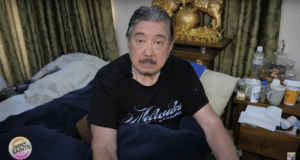There is a stark difference between PNR rides and LRT/MRT rides. (True, in both, a commuter experiences extreme congestion and heat, or takes a risk.) In an LRT/MRT trip, the commuter, looking outside, is “flying high” along major roads and commercial areas, feeling the rush of city life. On the other hand, a PNR trip on “ground level” is an in-your-face look at the urban poor communities and
industrial wastes of Metro Manila.
Transportation Secretary Joseph Abaya says he prefers that train operations be taken over by private corporations. This is the best way to achieve efficiency, Abaya assures. He doesn’t mention that the “private status” of the MRT has given rise to one of the country’s worst mismanaged mass transits. The anomalous build-lease-transfer contract entered into by the government and Metro Rail Transit Corp. (MRTC) has allowed the yearly (from 2000-2025) conversion of billions of pesos in taxpayer money
into guaranteed profits for the MRTC without the promise of safe, efficient services for commuters. Abaya’s assurance also means that if the proposed P54-billion buyout and takeover by the government of MRT operations pushes through, the MRT will still end up in the hands of a corporate partner.
The MRT’s deterioration reveals a twisted sense of modernity that the Aquino administration clings to in the form of public-private partnership (PPP). Of course, trains haven’t been the only target of President Aquino’s PPP; he has gone all out after hospitals, schools and other infrastructure projects. And the LRT’s privatization opens the rail, so to speak, to fare increases. The Department of Transportation and Communications expects the public to accept this in anticipation of less congested trains. But reality says otherwise: The privatization deal guarantees automatic, annual fare hikes.
The administration, MRTC and the Light Rail Consortium would like the public to believe that services or commuter welfare can be routinely sacrificed in the name of “growth.” Or that subsidizing utilities/services is an outdated practice. The fact is they are capitalizing on the present deficiencies in train operations to make overpriced fares the norm.
In contrast, the PNR is “left in the gutter” to deal with what government officials have continuously referred to as “eye sores” which are the result of poor, nay, lack of, urban planning.
President Aquino and Abaya’s policies leave those who cannot afford the increasing fares to confront their own economic and political problems.
This MRT/LRT direction is meant to benefit Aquino’s allies, relatives (e.g., the MRT7 extension project is headed by his uncle, Danding Cojuangco) and his political agenda. A successfully marketed PPP project is ammunition for legitimizing the “tuwid na daan” beyond 2016.
In truth, all Filipinos are bearing the cost of privatization under the flag of the PPP. The administration says privatization frees up subsidy for other services. On the contrary, a lot more of taxpayer money will be used to guarantee corporate profits.
—MICHAEL BELTRAN,
chair, Kabataang Artista para sa
Tunay na Kalayaan (Karatula),
karatulanasyunal@gmail.com


